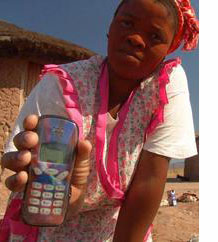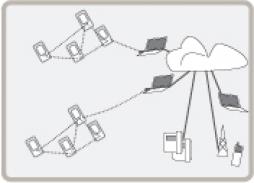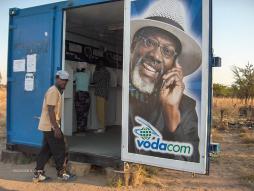Livelihood & Economic Development
Posted by CorinneRamey on Sep 24, 2007
Programs all over the world have shown how mobiles can be an effective tool in providing services to homeless individuals, people with AIDS, and other marginalized populations. Here are a few of the most effective efforts to involve mobiles in innovative ways.
The stereotype is that homeless people don't need mobiles. Why bother with a phone when you can barely afford to put food on the table or don't even have a bed to sleep in? But several different projects have shown that mobile phones can be an important stepping stone in brealing a cycle of poverty. Most importantly, mobiles allow homeless people to get jobs. Employers aren't likely to respond to a resume that lists the phone number of the local homeless shelter, or worse, one without a phone number at all.
Posted by KatrinVerclas on Sep 19, 2007
Owning a mobile is becoming an indispensable element of young people's lives all around the world. This well-done 30-min video focuses on mobiles in education, explores whether mobiles are a force for good, or an example of technology gone awry; and offers a lot of cultural analysis of how young people use mobiles.
Produced by teachers.tv about young people's use of mobiles (albeit UK-focused), it is a good look at the world of young people with mobile phones, and the impact on schools and education. Young people are mobile natives and schools and NGOs better take heed.
Posted by KatrinVerclas on Sep 18, 2007
We are starting a series of articles on mobile phones in economic development this week and to kick it off, Business Week in its current issue published a few interesting summaries of the state of affairs in mobiles in economic development. This apparently just to make it easy for us to get MobileActives around the world up to speed!
Upwardly Mobile in Africa describes farmers in Kenya using mobiles to bring their products to market and mobile payments using the Keyan mobile payment system M-Pesa. The article describes Grameen Foundation's Village Phone Program that we will be featuring in our next article that is expanding into Uganda in collaboration with the local carrier MTN where there are now 13,000 Village Phone Operators renting out a mobile phone with the help of microcredit and discounted airtime.
Posted by KatrinVerclas on Sep 12, 2007
MobileActive friend and colleague Anders Carlius runs Terranet, an innovative company providing mobile peer-to-peer technology. Anders is a former businessman from Sweden who decided he wanted to do good in the world with a new venture after a career in telecommunications. His company is after an emerging market in developing countries with either a rural or densely populated market (such as a refugee camp, for exaple).
The technology is simple: Terranet outfits a special Erricson phone with peer-to-peer wireless networking ability. In its pure form, there is no need for base stations, antenna installations or infrastructure. With this phone, a user can call and text anyone at no cost within two kilometers, or up to 20 kilometres in a mesh network. Through TerraNet wireless Internet access point, the phone turns into a normal wireless communication device.
From Terranet's prospectus:
Posted by KatrinVerclas on Jul 23, 2007
Technology that has been taken for granted by people in wealthy countries is making life easier and safer for many poor in developing countries.
The rapid spread of cellular telephones in many African countries has been a remarkable and unexpected phenomenon particularly when one considers the high levels of poverty and social turmoil that occurs in many of these countries. Last year the Enterprise Africa! team visited Botswana in order to document the poverty alleviating aspects of the cellular telephone. Technology that has long been taken for granted by people in wealthy countries is making life easier, safer, and more prosperous for many, including the poor in developing countries. A result of the rapid diffusion of this technology is the creation of a vast number of jobs and enterprises, enabling many Africans to escape the poverty trap.
The most obvious benefit of cellular telephones is that they provide access to communication where none existed before. Families in remote areas, and farmers and businesses that could not afford or even obtain fixed lines, are now able to talk with loved ones, receive orders, schedule deliveries, and make appointments. Mobile phones were an immediate success, even in areas that already had access to landlines, because in addition to connectivity they offered services like itemised billing, prepaid or contract options, and other value-added services.
Posted by KatrinVerclas on Jun 11, 2007
Protest campaigns in recent weeks in China and Pakistan are pointing to a quickening pace of social activism primarily enabled by mobile phones.
On May 31, 2007, authorities in Xiamen halted construction of a large petro-chemical plant, following a furious Internet, street, and text campaign. The story began on a few local blogs, spread wide on the Internet with sites like antipx.com, and street graffiti.
On March 25, according to news reports in the Asia Sentinel, Sydney Morning Herald and others, a text message began circulating:
Posted by KatrinVerclas on May 09, 2007
Ethan Zuckerman has written a solid overview of mobile phones in international activism. It is re-posted here under its Creative Commons license. For additional resources, see also the mobileactive.org Strategy Guides on using mobile phones in elections, advoacy, and fundraising.
Posted by on Jan 01, 1970
n/a
Posted by on Jan 01, 1970
n/a
Posted by on Jan 01, 1970
n/a
Posted by on Jan 01, 1970
n/a
Posted by on Jan 01, 1970
n/a
Posted by KatrinVerclas on Mar 15, 2006
 Great article in the UK Times about the mobile market in Africa and the enormous growth there.
Great article in the UK Times about the mobile market in Africa and the enormous growth there.
"This remarkable growth — the African market is expanding nearly twice as fast as Asia’s — has confounded analysts and even service operators. As recently as 2003, the International Telecommunications Union (ITU) forecast that there would be only 67 million users by the end of 2005.
“Many of us underestimated the strength of the informal sector in Africa,” said Michael Joseph, chief executive officer of Safaricom, Kenya’s biggest operator, with four million customers. “And the huge need and desire for people to communicate.”






